On the eve of the election, the list of candidates had been reduced from seven to four. On June 16, two hardliners – Saeed Jalili and Alireza Zakani – dropped out and endorsed Ebrahim Raisi, the frontrunner. Mohsen Mehralizadeh, the lone reformist, withdrew as well but did not explicitly endorse Abdolnasser Hemmati, the only remaining candidate who was not a hardliner. “Now that you have announced your withdrawal, you have made my responsibility heavier,” Hemmati wrote in an open letter to Mehralizadeh.
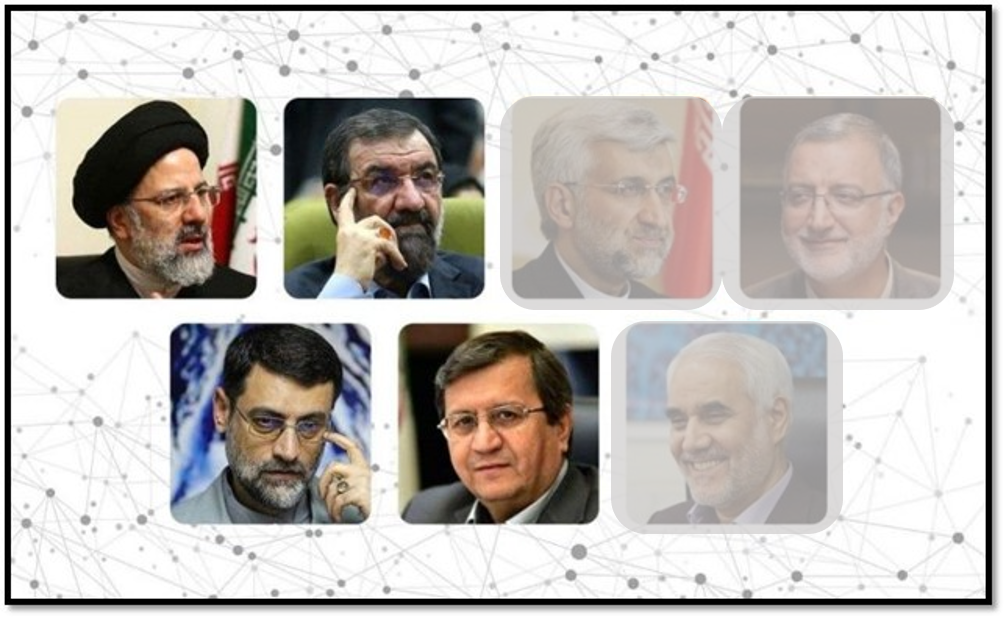
- Amir Hossein Ghazizadeh Hashemi: Four-term member of Parliament (2008 to present) representing Mashhad and Kalat district. A hardliner.
- Abdolnasser Hemmati: Former governor of the Central Bank of Iran (2018 to 2021) and a former vice president of Islamic Republic of Iran Broadcasting. A political centrist.
- Ebrahim Raisi: Judiciary chief (2019 to present), presidential candidate in 2017, deputy chief of the Assembly of Experts (2019 to present), and former prosecutor general. A hardliner.
- Mohsen Rezaei: Secretary of the Expediency Council, presidential candidate in 2005, 2009, and 2013 and a former Revolutionary Guards commander-in-chief. A hardliner.
The following are profiles of the approved candidates, in alphabetical order, and their statements on key issues:
The Candidates
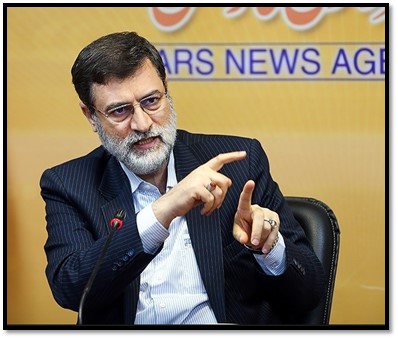 Amir Hossein Ghazizadeh Hashemi, born in 1971, is a hardline politician and four-term member of parliament. He is a doctor with a specialty in head and neck surgery. He was formerly chancellor of Semnan University of Medical Sciences and Health Services. In 2008, he was elected to Parliament for Mashhad and Kalat in Razavi Khorasan province. He was reelected in in 2012, 2016 and 2020. In 2016, Ghazizadeh Hashemi was chosen as first deputy speaker in Parliament under Speaker Ali Larijiani. As deputy speaker, Ghazizadeh Hashemi expressed staunch support for Palestinian militants, including Hamas and Palestinian Islamic Jihad. In September 2020, he denounced the normalization of relations between the United Arab Emirates and Israel as “apostasy.”
Amir Hossein Ghazizadeh Hashemi, born in 1971, is a hardline politician and four-term member of parliament. He is a doctor with a specialty in head and neck surgery. He was formerly chancellor of Semnan University of Medical Sciences and Health Services. In 2008, he was elected to Parliament for Mashhad and Kalat in Razavi Khorasan province. He was reelected in in 2012, 2016 and 2020. In 2016, Ghazizadeh Hashemi was chosen as first deputy speaker in Parliament under Speaker Ali Larijiani. As deputy speaker, Ghazizadeh Hashemi expressed staunch support for Palestinian militants, including Hamas and Palestinian Islamic Jihad. In September 2020, he denounced the normalization of relations between the United Arab Emirates and Israel as “apostasy.”
Ghazizadeh Hashemi demanded that the Rouhani government take a harder line with the West after the Trump administration withdrew from 2015 nuclear deal in 2018. He called INSTEX – the European financial mechanism meant to bypass U.S. sanctions – a “disgrace” and said that there was “no hope” that Europeans would be able to save the nuclear deal. Ghazizadeh Hashemi also pushed for Iran to withdraw from the Non-Proliferation Treaty and expel nuclear inspectors if U.N. sanctions were reimposed on Iran. In December 2020, he backed legislation that required the government to enrich uranium to 20 percent – above the 3.67 percent limit allowed in the nuclear deal. Hashemi was pessimistic about the prospects of negotiations with the Biden administration. “How the agreement will be implemented in the text must be clear, otherwise the agreement is useless,” he said in May 2021.
- On the nuclear deal: "If the outcome of the Vienna talks only leads to the signing of two texts, this agreement is worthless…The way the agreement will be implemented in the text must be clear, otherwise the agreement is useless and just good news that does not lead to practical measures, he said in an interview with IranPress on May 19, 2021. “Iran fulfilled its obligations under the agreement; however, it was the European parties who failed to fulfill their commitments. Therefore, staying in such a situation is, strategically, to the detriment of national interests and authority of the Islamic Republic of Iran, he told Mehr News Agency on Dec. 6, 2020.
- On the economy: “Our rules about commerce, insurance, and banking should be restructured. However, now the problem is that the government’s knee is on people’s neck,” he said during the first presidential debate on June 6.
- On U.S. military presence in the Persian Gulf: “Iranian forces are able to catch the US’ atomic submarines and Tehran is not worried about U.S. military activities in the Persian Gulf waters… U.S. and U.K. have created bases in Persian Gulf littoral states and everywhere that these two countries are present means Israel has infiltrated there,” he said in an interview with Arabic RT on Dec. 22, 2020.
- On Israel-UAE normalization: “One of Islam’s obligations is to defend the oppressed and counter oppression. When the Emirates officially establishes and declares relations with Israel, this, in fact, amounts to the issuance of a statement declaring the apostasy of this country,” he said interview with Fars News Agency on Sept. 5, 2020.
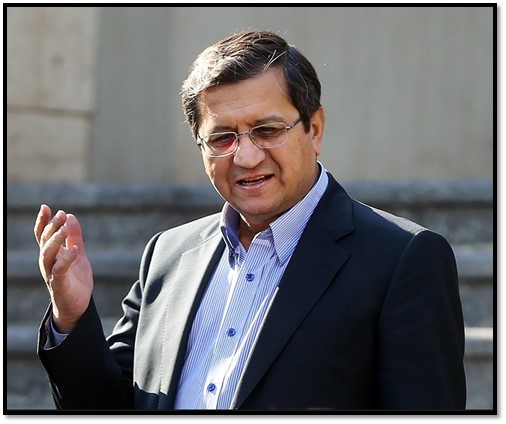 Abdolnasser Hemmati, born in 1957, is a centrist politician and banker. He holds a doctorate in economics from the University of Tehran. During the 1980-1988 war with Iraq, Hemmati was the director general of the news department at Islamic Republic of Iran Broadcasting (IRIB), a state media outlet. Hemmati was placed in charge of war messaging. After the war, he served as vice president of IRIB from 1989 to 1994. In 2001, Hemmati was appointed to the economic committee of the Supreme National Security Council, a position he held until 2006. Hemmati left for the private sector, but he retained ties with Supreme Leader Ayatollah Ali Khamenei. He was CEO of Bank Sina from 2006 to 2013 and CEO of Bank Melli from 2013 to 2016. Both banks were sanctioned by the Obama administration for servicing entities involved in Iran’s nuclear and ballistic missile programs; both banks were removed from the sanctions list as part of the 2015 nuclear deal.
Abdolnasser Hemmati, born in 1957, is a centrist politician and banker. He holds a doctorate in economics from the University of Tehran. During the 1980-1988 war with Iraq, Hemmati was the director general of the news department at Islamic Republic of Iran Broadcasting (IRIB), a state media outlet. Hemmati was placed in charge of war messaging. After the war, he served as vice president of IRIB from 1989 to 1994. In 2001, Hemmati was appointed to the economic committee of the Supreme National Security Council, a position he held until 2006. Hemmati left for the private sector, but he retained ties with Supreme Leader Ayatollah Ali Khamenei. He was CEO of Bank Sina from 2006 to 2013 and CEO of Bank Melli from 2013 to 2016. Both banks were sanctioned by the Obama administration for servicing entities involved in Iran’s nuclear and ballistic missile programs; both banks were removed from the sanctions list as part of the 2015 nuclear deal.
In June 2018, Hemmati was named ambassador to China. But he was quickly recalled and appointed to head the Central Bank of Iran (CBI) after the prior governor, Valiollah Seif, resigned over allegations of fraud and mismanagement. Hemmati took over the Central Bank during the height of the Trump administration’s “maximum pressure” campaign, which included U.S. sanctions on the Central Bank for supporting the Revolutionary Guards and Hezbollah in Lebanon. As CBI governor, Hemmati revamped Iran’s currency to simplify financial transactions. He also negotiated the purchase of COVID-19 vaccines from Japan and South Korea using Iranian assets frozen in both countries. In April 2021, Hemmati sent CBI officials to the Vienna talks between Iran and the six major world powers to ensure U.S. sanctions on the CBI were lifted. In May 2021, Hemmati told Iranian lawmakers that he was “hopeful” about negotiations. On May 30, Rouhani's cabinet dismissed Hemmati from his position at the Central Bank because he would not be able to fulfil is duties while campaigning. During the campaign, Hemmati has identified as a reformist while also downplaying the importance of labels. “Reformist and principlist (hardliner) no longer makes sense; I am your humble voice,” he said during an event on June 4 on Clubhouse, an audio-based platform. Hemmati has also said that he wants to be the voice of the “silent majority.”
- On U.S. sanctions: “Over the past two years, the Central Bank has been under increasing pressure, mainly due to the sanctions and the negative supply shocks, especially at a time when the accumulated liquidity force is being drained on prices, since other problems, including the coronavirus outbreak and the budget deficit, have led to the inevitable escalation of liquidity growth,” he said in 2020. In 2019, he wrote on Instagram, “The U.S. administration’s recent measure against the IRGC is the last sign of failure of its policy to pressure the Iranian nation and the financial and monetary sanctions in the past year… The CBI along with the government will powerfully implement its plans, including access to sustainable, safe and sanction-proof foreign currency, and such measures will not leave any durable impacts on the markets.”
- On nuclear talks: “I think we haven't seen anything serious from Mr. Biden's side yet… They first need to go back to the (nuclear deal) that they withdrew from. If we see the process and more confidence is built, then we can talk about that,” he told the Associated Press in June 2021.
- On the U.S. assassination of General Qassem Soleimani: “His efforts were mostly focused on standing up against the United States' pressures on the country, and we, as the economic sector of the nation, are obliged to follow his efforts in order to counteract the enemy's economic pressures,” he said at a memorial service for Soleimani in January 2020.
- On the economy: The "coronavirus pandemic caused the country's economic growth, which was on the verge of becoming positive, to become negative again, but the resilience of the Iranian economy helped it to overcome the recession after a while and the country's economic growth became positive again," he said on state television on March 27, 2021.
- On commerce: “Iran must engage in trade with rest of the world; it cannot survive individually,” he said during the third presidential debate on June 12, 2021.
- On social restrictions: “Control over people’s lives should be lifted,” he said during the second debate on June 8, 2021.
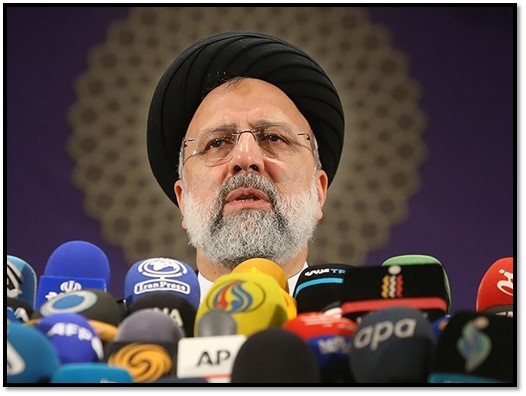 Ebrahim Raisi, born in 1960, is a hardline cleric and the chief of the national judiciary. He holds a doctorate in Islamic jurisprudence and law. Raisi became a prosecutor in the early 1980s. As deputy prosecutor general of Tehran, he reportedly participated in the so-called “death commission” that ordered the extrajudicial executions of thousands of political prisoners in 1988. Raisi served as prosecutor general of Tehran between 1989 and 1994 and first deputy head of the judiciary from 2004 to 2014. In 2006, Raisi was elected to the Assembly of Experts, which is charged with appointing and overseeing the supreme leader. After the disputed 2009 presidential election, Raisi supported the brutal crackdowns and showed little tolerance for public dissent. He was Iran’s prosecutor general from 2014 to 2016.
Ebrahim Raisi, born in 1960, is a hardline cleric and the chief of the national judiciary. He holds a doctorate in Islamic jurisprudence and law. Raisi became a prosecutor in the early 1980s. As deputy prosecutor general of Tehran, he reportedly participated in the so-called “death commission” that ordered the extrajudicial executions of thousands of political prisoners in 1988. Raisi served as prosecutor general of Tehran between 1989 and 1994 and first deputy head of the judiciary from 2004 to 2014. In 2006, Raisi was elected to the Assembly of Experts, which is charged with appointing and overseeing the supreme leader. After the disputed 2009 presidential election, Raisi supported the brutal crackdowns and showed little tolerance for public dissent. He was Iran’s prosecutor general from 2014 to 2016.
In 2016, Supreme Leader Khamenei appointed Raisi to be custodian of Astan Quds Razavi, a charitable foundation with assets reportedly worth billions of dollars; he held the position for three years. In the 2017 presidential election, Raisi came in second, with 38 percent of the vote in a four-way contest, but he lost to incumbent Hassan Rouhani, who got 57 percent of the vote. Raisi is widely considered a potential successor to Khamenei. He has served as judiciary chief and deputy chief of the Assembly of Experts since March 2019. Raisi was sanctioned by the U.S. Treasury in November 2019 for his role in domestic repression and actions on behalf of Khamenei.
- On the nuclear deal: “Some [politicians] hold sessions to see what they can get from westerners. If they had held sessions [at home] on how to boost production and remove obstacles, many problems would have been resolved by now,” he said in Tehran on April 26, 2021. Yet during a presidential debate on June 12, 2021, he said, “We will abide by the JCPOA, which the supreme leader approved, but you (Hemmati) cannot implement it. Implementing the JCPOA requires a strong government.”
- On U.S. sanctions: “Any elected government should prioritize lifting sanctions. But we shouldn’t allow sanctions to affect our economy,” he said during the second presidential debate on June 8, 2021.
- On the economy: “What we see in the country today has nothing to do with sanctions, it is related to internal mismanagement. Sanctions have created problems, but they are more about mismanagement,” he said on television on June 7.
- On the Rouhani administration: “This (outgoing administration) is like a goalkeeper who lets in 17 goals… and then says without me it would have been 30 goals.”
- On the 2021 election: “God, you are witness that I have never been after position or power, and even at this stage I have entered the field despite personal will and interests, and only to serve my duty to answer the people and elites and create hope… I have come as an independent to the stage to make changes in the executive management of the country and to fight poverty, corruption, humiliation and discrimination,” he said in announcing his candidacy on May 15, 2021.
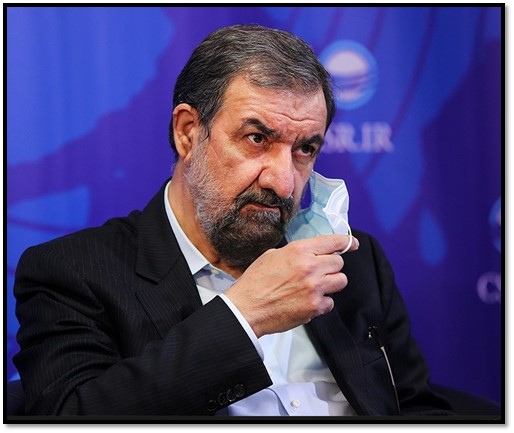 Mohsen Rezaei, born in 1954, is a conservative politician and Revolutionary Guard (IRGC) veteran. He holds a doctorate in economics. He served as IRGC commander-in-chief from 1981 to 1997. Rezaei was a senior commander during the eight-year war with Iraq. Under his command, the IRGC eclipsed Iran’s regular military, the Artesh, and became an important economic player. Rezaei later claimed that he was instrumental in creating the Qods Force, the IRGC’s external operations arm. In 1994, he was allegedly involved in planning a suicide bombing of a Jewish cultural center in Argentina. INTERPOL placed Rezaei and five other Iranians on its most-wanted list in 2007 for connections to the attack.
Mohsen Rezaei, born in 1954, is a conservative politician and Revolutionary Guard (IRGC) veteran. He holds a doctorate in economics. He served as IRGC commander-in-chief from 1981 to 1997. Rezaei was a senior commander during the eight-year war with Iraq. Under his command, the IRGC eclipsed Iran’s regular military, the Artesh, and became an important economic player. Rezaei later claimed that he was instrumental in creating the Qods Force, the IRGC’s external operations arm. In 1994, he was allegedly involved in planning a suicide bombing of a Jewish cultural center in Argentina. INTERPOL placed Rezaei and five other Iranians on its most-wanted list in 2007 for connections to the attack.
Rezaei retired from the military in 1997 and was appointed secretary of the Expediency Council by Khamenei that same year. He became head of the council’s Commission for Macroeconomics and Commerce in 1998. In 2000, Rezaei ran unsuccessfully for Parliament to represent Tehran. In 2005, Rezaei ran for the presidency, but his campaign failed to gain momentum. He dropped out two days before the election. Rezaei ran for the presidency again in 2009. He came in third place, in a field of four candidates, with less than two percent of the vote. Rezaei ran again 2013, when he came in fourth among six candidates, with about 11 percent of the vote. In 2020, the U.S. Treasury sanctioned Rezaei for his role in advancing Iran’s “destabilizing objectives.”
- On the nuclear deal: “We have to see every month during the talks that some sanctions which are of urgency to us are being lifted…For instance, sanctions on financial transactions and restrictions that European banks have imposed should be lifted in the first month. Oil exports are also among our top priorities,” he said in an interview with Financial Times on March 5, 2021.
- On the U.S. assassination of Qassem Soleimani: “Iran’s revenge against America for the assassination of Soleimani will be severe… Haifa and Israeli military centers will be included in the retaliation,” he told mourners in Tehran on Jan. 5, 2020.
- On Iran’s regional activities: “The fear of the West goes beyond the fear of Iran producing a nuclear bomb, because if the Greater Iran emerges north of the Gulf and the Sea of Oman, 15 countries will join Iran. If the Greater Iran is formed, it will interfere with global policymaking. Our duty is to bring back again the glory, greatness and might of ancient Persia, and we can carry out this task,” he told Payame Noor University students in December 2020.
- On Israel: “We would raze Tel Aviv to the ground for sure. We have been looking for such a pretext. If they do something, we can use it as a pretext to attack Israel, because Israel played a role in the martyrdom of Gen. Soleimani. It was the Israelis who reported about the martyr Soleimani’s trip from Damascus to Baghdad. We were waiting for the Americans to give us a pretext to strike Tel Aviv, just like we attacked Ain al Asad,” he said in an interview with a Lebanese TV channel on February 8, 2020.
Julia Dickson, an intern at the Woodrow Wilson International Center for Scholars, helped assemble this report.
Photos of candidates via Iran Front Page News (CC By 4.0), Fars News Agency (CC BY 4.0) and Tasnim News Agency (CC By 4.0)
